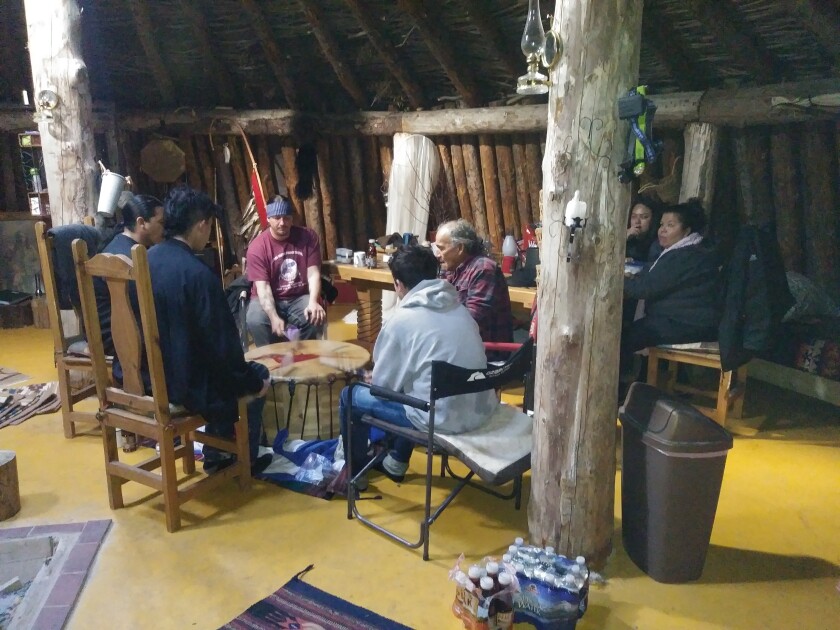GRANITE FALLS, Minn. — Their goal is to build seven traditional Dakota earth lodges and live in a sustainable way while practicing the centuries-old way of life of their ancestors.
It will require an act of the Legislature to live the traditional Dakota life today.
“That’s the irony and the painful reminder,” said Waziyatawin, who is among the members of Makoce Ikikicupi , a nonprofit devoted to Dakota land recovery. “I often say it is illegal to be Dakota in the Dakota homeland.’’
She and other members of Makoce Ikikicupi used funds raised by supporters of their effort to recover Dakota lands to purchase approximately 21 acres of land just west of Granite Falls in the Minnesota River Valley. The site is above the rodeo grounds along U.S. Highway 212. They acquired a land use permit from Yellow Medicine County for the site, and complied with a requirement to notify the city of Granite Falls about their building plans.
Last summer, they began to erect three earth lodges on the site. They intend to erect the timber and earth structures and live as a small village. Waziyatawin and her husband intend to make one of the lodges their home. She expects that the other lodges will also have year-round residents; some could be families with children.
ADVERTISEMENT
Volunteers helping the group erected the central columns, the outer ring of poles and got some of the rails in place on the three lodges last summer when the cease and desist order came from the city of Granite Falls. Under his obligation to enforce the state building code, the city’s building inspector advised the group that the structures were not in compliance. There are a variety of building code issues, chief among them a fire safety code requiring two exits. The traditional lodges have one.
The city is on record as not being opposed to the project, but it must enforce the building code, according to Granite Falls Mayor Dave Smiglewski. The city retained the assistance of a legal firm to help draft a bill for the Legislature seeking an exemption from state building codes for the project, he said.
The bill is currently before the Legislature. It is modeled after legislation that allows the Amish in Wisconsin and Pennsylvania to build homes that are not in conformance with state building codes. The legislation here would allow the state fire marshal to issue building-specific exemptions of the state fire code that conflict with a “recognized tribe’s religious beliefs, traditional building practices, or established teachings.”
When the cease and desist order arrived, Waziyatawin said she and the others who have been volunteering their time to this project contacted Upper Sioux Tribal Chairman Kevin Jensvold seeking the tribe’s support. The Upper Sioux Community was the first of the state’s 11 tribal communities to voice support for the legislation now introduced. She recently met with the Minnesota American Indian Affairs Council. She said the council was supportive as well: The council represents the state’s seven Anishinaabe reservations and four Dakota communities.
If built as hoped, the earth lodges would be open to all Dakota and Indigenous people of the Oceti Šakowiŋ , or Seven Council Fires of the Dakota peoples. Waziyatawin noted that the Anishinaabe people in Minnesota may be interested in developing traditional earth lodges as well, and support the legislation.
Waziyatawin is the author of the 2008 book, “What Does Justice Look Like? The Struggle for Liberation in Dakota Homeland." She calls for the return of lands taken from the Dakota. She holds a doctorate in American history and has held tenured positions at Arizona State University and the University of Victoria, British Columbia, Canada. She is a member of the Upper Sioux Community.
Her book opened up the discussions 10 years ago that led supporters to raise funds on behalf of Dakota land recovery. She said members of Makoce Ikikcupi don't feel it is just for the Dakota to buy back land stolen from them. Non-native supporters responded that they would raise funds, she said. More than $140,000 has been raised, according to the Makoce Ikikcupi website, and helped make possible this goal of putting traditional Dakota ways into practice.
Among the financial supporters is John Stoesz of Newton, Kan. He contributed his share of financial assets from the sale of his grandparents' farm estate near Mountain Lake, Minn. In 2013, he pedaled his three-wheeled recumbent cycle through 40 southern Minnesota counties, all part of the traditional Dakota homeland, to raise awareness of the land reparation issue.
ADVERTISEMENT
Stoesz, who had served as the director of the Mennonite Central Committee, said he came to understand how land was stolen from Indigenous peoples in the Americas. The “Doctrine of Discovery” was used for centuries to justify taking the land and cultures from Indigenous people. He said he feels that returning a portion of the proceeds from his grandparents' farm was the “right thing to do.”
One of the challenges the members of Makoce Ikikicupi faced at the start of their project 10 years ago was that of determining what a traditional lodge should be.
As far as anyone knows, the last of the traditional Dakota earth lodges existed along Lake Mille Lacs in the 1750s, according to Waziyatawin. She said they undertook their own research to develop the lodges.
One has since been built on the Lake Traverse reservation in South Dakota. She and her husband have been living there. They use wood for heat and cooking. There is no running water. It has no electricity, and its location is also outside of cellphone service. They have a composting toilet.
Waziyatawin said their plans for the earth lodges near Granite Falls incorporate a few adaptations to meet the needs of today. Cement pads are being used to extend the longevity of the timbers being used. She pointed out that the earth lodges built by her ancestors were likely replaced roughly every 15 years. The environmental resources needed are more scarce today, and the group wants to make these structures longer lasting. The central logs are tamarack.
The site has been connected to a rural water system to provide water at a single, central spigot. It was not possible to develop a well at the site, she explained.
The earth lodges will remain simple and sustainable, but that doesn’t mean they are rugged or uncomfortable. The lodges offer a very comfortable environment, warm in winter and cool in summer, and very welcoming, she said. Her lodge on the Lake Traverse reservation is a place for learning, she said. People come and learn traditional crafts, hand games, moccasin games along with singing and drumming.
“The idea is you can live simply and live with beauty and integrity, and it can be a comfortable, lovely lifestyle,” she said.
ADVERTISEMENT
The goal at Granite Falls is to develop both perennial and annual gardens at the site. She said the group must also develop a governing structure for the small village.
Long term, she said they hope to see other similar sites developed. If land can be obtained, she would also like to see the group have locations where they could harvest wild rice, or tap maple trees as did their ancestors.
But first, the group must obtain legislation to allow them to build the earth lodges. She said the group rejected any idea of thwarting the building code, say by possibly terming the lodges as temporary or seasonal structures.
“It felt very deceptive if in the 21st century we have to lie so we can do it,” she said. “Part of our mission is to work towards land justice. It seemed in opposition to our mission.”















